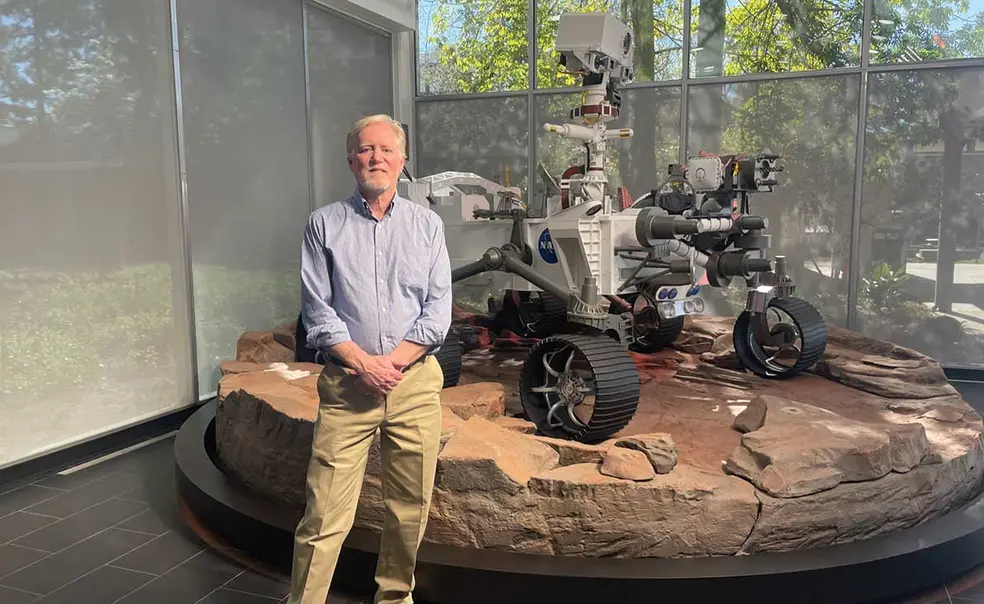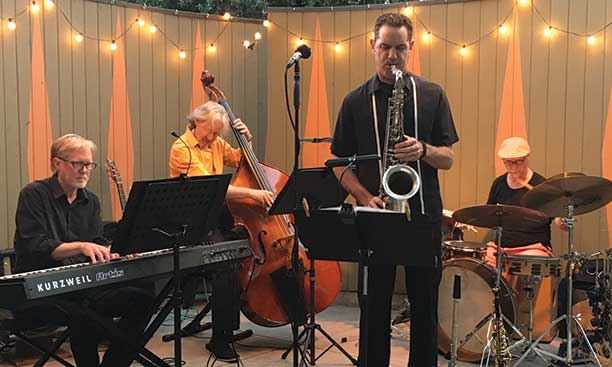Chad Edwards ’79 Is Bringing Space Exploration to Life
Edwards, a physicist, leads NASA projects on Mars
As hard as it is to get a spacecraft to Mars, Chad Edwards ’79 and his team at NASA’s Jet Propulsion Lab (JPL) in Pasadena, California, have perhaps an even harder job: to think about future missions and imagine what technologies will be needed to make them successful.
To pick just one such mission, sometime in the next decade NASA hopes to retrieve soil samples from Mars and return them to Earth for analysis. The first small steps in this exceedingly complicated mission have already been taken. Last September, the Perseverance rover drilled into the Martian surface near Jezero Crater, extracted a sample of ground rock, and deposited it into a hermetically sealed titanium tube. Over the next several months, it will collect dozens more samples and eventually drop them on the surface. In 2033, if all goes according to plan, those samples will be retrieved by another rover, which will return them to a landing vehicle where they will be launched into Martian orbit (the first time anything has ever been launched off another planet), picked up by yet another unmanned spacecraft, and brought back to Earth.
For the last four years, as manager of the Advanced Studies Office for the Mars Exploration Program, Edwards has been responsible for imagining such future missions and what needs to be done now to get them underway. For example, although NASA and JPL are committed to the Mars Sample Return Mission, as it is known, many of its components are still being designed.
The Mars Sample Return Mission is just one of the many projects on the JPL drawing board. Others include sending a 30-kilogram helicopter (about 66 pounds) to Mars, which would build on the success of the tiny 1.8-kilogram helicopter (about 4 pounds), named Ingenuity, that made its first experimental flights last year; a “rough lander” that could deliver science payloads to Mars much more cheaply; and a lander that could drill 100 meters into the Martian surface searching for signs of life.
Before taking on his current assignment in 2017, Edwards headed the team that worked on communications with the orbiters circling Mars and the rovers crawling around on its surface. The rovers themselves are not powerful enough to transmit signals all the way back to Earth. Instead, scientists at JPL beam signals to the orbiters, which relay them to the rovers. The rovers then send data and photos back to Earth the same way.
Edwards has been at JPL since 1984, but he describes getting there as “a little bit of a left turn” in his expected career path. After studying physics at Princeton, Edwards earned a Ph.D. in particle physics at Caltech. Preferring not to follow a typical academic path, he went to a JPL job fair and has worked there ever since. Because the JPL is run on a contract between NASA and Caltech, Edwards is a Caltech faculty member rather than a NASA employee. He says he prefers it that way. Thanks to its unique structure, he says, the JPL “has this combination of university collegiate environment and research-lab environment. I very much like that.”
Mars, though, is only Edwards’ day job — he is also an accomplished jazz pianist. As an undergraduate, Edwards played keyboard in a band called Spiral and also played with guitarist Stanley Jordan ’81. He now performs with several groups in and around Los Angeles. One of them, a “retro-jazz quintet” named Zen Dadio, played on the soundtrack of the Academy Award-winning 1999 film American Beauty. Edwards’ 2002 solo CD, Resolution, was praised by Los Angeles Times music critic Paul Anderson as “one of my favorite releases this year.”
The mathematical structure of music appeals to many scientists, and Edwards notes that he is not the only musician working at JPL. Fortunately, he has time to pursue both interests. In terms of the hours he puts into it, Edwards says, space exploration is his primary focus. “But there would be a big hole in my life if I were not playing music, too,” he says. “It keeps my life balanced.”











No responses yet